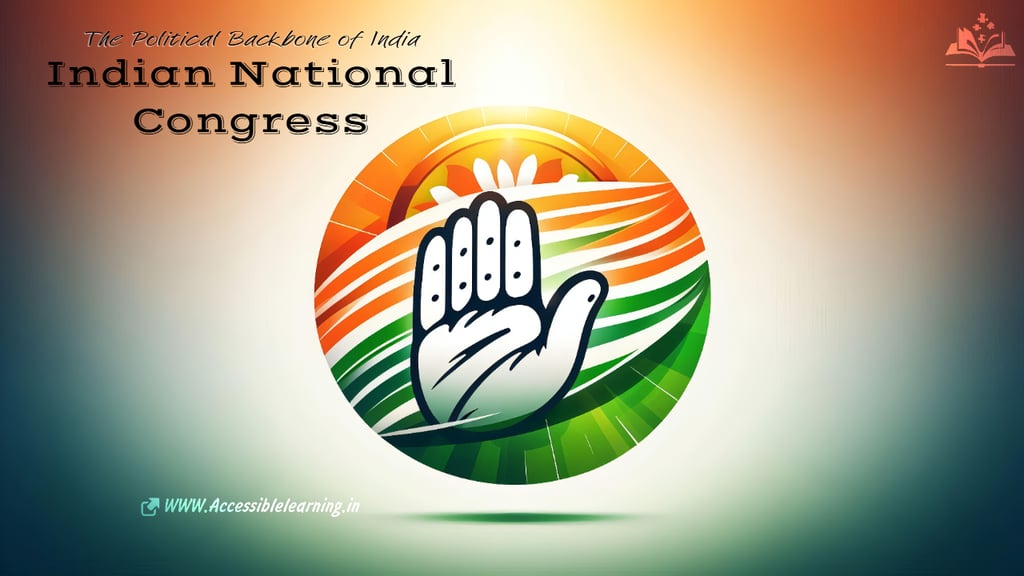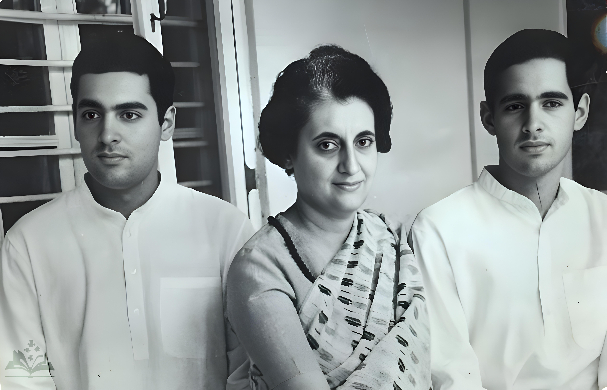
The Rise and Evolution of the Congress Party in India
The comprehensive journey of the Indian National Congress, India’s oldest political party, from its role in the freedom struggle to its modern-day challenges. Delve into its achievements, leadership, and evolving vision for the nation.
INCBIOGRAPHY/HISTORYEDUCATION/KNOWLEDGEINDIA/BHARAT
Sachin K Chaurasiya
1/25/20255 min read


The Indian National Congress (INC), established on December 28, 1885, is not just a political party but a significant chapter in India’s struggle for independence and its democratic journey. Often referred to as the Congress Party, it has played a pivotal role in shaping the political, economic, and social landscape of the country. With its long-standing history and substantial contributions, the INC remains one of the most influential entities in Indian politics.
Origins and Early Years
The INC was founded during British rule by Allan Octavian Hume, along with Dadabhai Naoroji and Dinshaw Wacha, with the intent to create a platform for civil and political dialogue between Indians and the British administration. The first session was held in Bombay (now Mumbai) and was attended by 72 delegates from across India. Initially, the Congress advocated for modest reforms, such as greater representation of Indians in government and administrative reforms.
However, the 20th century marked a turning point for the INC, as it evolved from a platform of dialogue to a movement for complete independence. This transformation was driven by leaders like Bal Gangadhar Tilak, Gopal Krishna Gokhale, and later, Mahatma Gandhi, who introduced the philosophy of non-violence and civil disobedience.
Role in India’s Independence Movement
The Congress emerged as the torchbearer of India’s freedom struggle, mobilizing masses through movements like:
Non-Cooperation Movement (1920-22): Led by Mahatma Gandhi, this movement encouraged Indians to boycott British goods, institutions, and services.
Civil Disobedience Movement (1930-34): Marked by the historic Dandi March, it aimed to defy oppressive British laws.
Quit India Movement (1942): A decisive call for immediate independence, this movement galvanized the nation against colonial rule.
Leaders like Jawaharlal Nehru, Sardar Vallabhbhai Patel, Subhas Chandra Bose, and others significantly shaped the party’s ideology and strategies during this era. The culmination of these efforts led to India’s independence on August 15, 1947.
Post-Independence Era and Governance
Post-independence, the INC became the dominant political force in India, with Jawaharlal Nehru serving as the first Prime Minister. Under his leadership, India adopted a democratic framework, focusing on industrialization, social reforms, and non-alignment during the Cold War. The Congress-led government also introduced landmark initiatives such as:
Five-Year Plans for Economic Development.
Land reforms aimed at reducing feudal land ownership.
Establishment of premier institutions like the IITs and AIIMS.
The INC continued to dominate Indian politics under leaders like Lal Bahadur Shastri, Indira Gandhi, and Rajiv Gandhi, implementing policies that shaped modern India. However, this period also witnessed challenges like the Emergency (1975–77) under Indira Gandhi and growing political opposition.
Key Achievements of the Congress Party
Green Revolution: The Congress government under Indira Gandhi’s leadership played a crucial role in launching the Green Revolution, which transformed India into a self-sufficient agricultural powerhouse.
Economic Reforms of 1991: Under the leadership of Prime Minister P.V. Narasimha Rao and Finance Minister Dr. Manmohan Singh, the Congress government initiated economic liberalization policies that opened up India’s economy to global markets.
Social Reforms: Over the decades, the INC has championed causes such as women’s empowerment, minority rights, and affirmative action for Scheduled Castes and Tribes.
Technological Advancement: The establishment of ISRO and focus on nuclear research under Congress-led governments laid the foundation for India’s advancements in space and technology.
Panchayati Raj System: The Congress government under Rajiv Gandhi’s leadership introduced constitutional amendments to strengthen local self-governance, empowering rural India.
Right to Information Act (2005): Enacted during the UPA government, this legislation revolutionized transparency and accountability in governance.
Challenges and Decline in Influence
By the late 20th century, the INC faced increasing challenges from regional parties and the rise of the Bharatiya Janata Party (BJP). Corruption scandals, economic crises, and internal dissent eroded public trust. The 1991 assassination of Rajiv Gandhi was a significant blow to the party, although it managed to form governments under P.V. Narasimha Rao and later under Dr. Manmohan Singh (2004-2014).
The economic liberalization policies of the 1990s marked a significant shift in India’s economic trajectory but also exposed the party to criticism from various quarters. In the 21st century, the Congress has struggled to regain its dominant position, facing electoral defeats and leadership challenges.
Ideology and Vision
The Congress identifies itself as a centrist party, advocating for secularism, social justice, and inclusive development. It emphasizes:
Unity in diversity: Promoting harmony among India’s various religions, languages, and cultures.
Economic equity: Bridging the gap between the rich and the poor through progressive policies.
Democratic values: Strengthening institutions and upholding the Constitution.
Sustainability and Environment: In recent years, the INC has also focused on policies addressing climate change and environmental conservation.
Modern-Day Challenges and Leadership
Today, the INC is led by Mallikarjun Kharge, with Rahul Gandhi and Priyanka Gandhi Vadra playing significant roles in rejuvenating the party. The Bharat Jodo Yatra led by Rahul Gandhi in 2022–23 aimed to reconnect with the grassroots and address key issues like unemployment, inequality, and communal harmony.
However, the party faces formidable challenges, including:
Rebuilding its organizational structure.
Addressing leadership crises and factionalism.
Competing with the BJP’s electoral machinery and popular appeal.
Formulating a cohesive strategy to address the aspirations of India’s burgeoning youth population.
Criticism of the Congress Party
Allegations of Corruption: Over the years, the INC has faced accusations of corruption, including high-profile scandals like the Bofors Scandal, the Commonwealth Games scam, and the 2G Spectrum case.
Lack of Leadership: Critics have pointed to a perceived over-reliance on the Nehru-Gandhi family and a lack of second-tier leadership.
Policy Paralysis: The UPA-II government (2009-2014) was criticized for policy inaction and an inability to address key economic challenges.
Electoral Decline: The party’s vote share has consistently declined in recent national and state elections, raising questions about its relevance in contemporary politics.
Legacy and Future Prospects
Despite its current challenges, the Indian National Congress remains synonymous with India’s freedom struggle and its democratic evolution. Its legacy is enshrined in the institutions it built, the leaders it produced, and the vision it espoused for a united, prosperous India.
To reclaim its position, the Congress must:
Focus on grassroots mobilization and strengthening its cadre base.
Develop a clear and cohesive policy framework addressing modern India’s challenges, such as digital transformation, job creation, and environmental sustainability.
Nurture regional leaders to counter the rise of state-level parties.
Reconnect with the aspirations of young voters and marginalized communities.
The road ahead for the INC involves introspection, reform, and a renewed connection with the aspirations of modern India. With its rich history and experience, the Congress holds the potential to reclaim its place as a significant force in Indian politics.
The Indian National Congress, with its unparalleled contribution to India’s freedom struggle and its role in shaping the country’s democratic and economic foundations, holds a unique position in Indian history. While the party faces significant challenges in contemporary politics, its legacy of promoting secularism, social justice, and inclusive development continues to inspire. To regain its relevance, the INC must adapt to changing times, address internal issues, and reconnect with the aspirations of modern India. With introspection and strategic reforms, the Congress can still play a pivotal role in India’s political landscape.


Subscribe To Our Newsletter
All © Copyright reserved by Accessible-Learning Hub
| Terms & Conditions
Knowledge is power. Learn with Us. 📚


